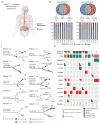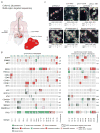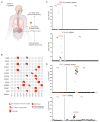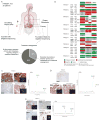Genomic Heterogeneity as a Barrier to Precision Medicine in Gastroesophageal Adenocarcinoma
- PMID: 28978556
- PMCID: PMC5894850
- DOI: 10.1158/2159-8290.CD-17-0395
Genomic Heterogeneity as a Barrier to Precision Medicine in Gastroesophageal Adenocarcinoma
Abstract
Gastroesophageal adenocarcinoma (GEA) is a lethal disease where targeted therapies, even when guided by genomic biomarkers, have had limited efficacy. A potential reason for the failure of such therapies is that genomic profiling results could commonly differ between the primary and metastatic tumors. To evaluate genomic heterogeneity, we sequenced paired primary GEA and synchronous metastatic lesions across multiple cohorts, finding extensive differences in genomic alterations, including discrepancies in potentially clinically relevant alterations. Multiregion sequencing showed significant discrepancy within the primary tumor (PT) and between the PT and disseminated disease, with oncogene amplification profiles commonly discordant. In addition, a pilot analysis of cell-free DNA (cfDNA) sequencing demonstrated the feasibility of detecting genomic amplifications not detected in PT sampling. Lastly, we profiled paired primary tumors, metastatic tumors, and cfDNA from patients enrolled in the personalized antibodies for GEA (PANGEA) trial of targeted therapies in GEA and found that genomic biomarkers were recurrently discrepant between the PT and untreated metastases. Divergent primary and metastatic tissue profiling led to treatment reassignment in 32% (9/28) of patients. In discordant primary and metastatic lesions, we found 87.5% concordance for targetable alterations in metastatic tissue and cfDNA, suggesting the potential for cfDNA profiling to enhance selection of therapy.Significance: We demonstrate frequent baseline heterogeneity in targetable genomic alterations in GEA, indicating that current tissue sampling practices for biomarker testing do not effectively guide precision medicine in this disease and that routine profiling of metastatic lesions and/or cfDNA should be systematically evaluated. Cancer Discov; 8(1); 37-48. ©2017 AACR.See related commentary by Sundar and Tan, p. 14See related article by Janjigian et al., p. 49This article is highlighted in the In This Issue feature, p. 1.
©2017 American Association for Cancer Research.
Conflict of interest statement
Figures




Comment in
-
Genomic Analyses and Precision Oncology in Gastroesophageal Cancer: Forwards or Backwards?Cancer Discov. 2018 Jan;8(1):14-16. doi: 10.1158/2159-8290.CD-17-1295. Cancer Discov. 2018. PMID: 29311223
References
-
- Ferlay J, Soerjomataram I, Dikshit R, Eser S, Mathers C, Rebelo M, et al. Cancer incidence and mortality worldwide: Sources, methods and major patterns in GLOBOCAN 2012. Int J Cancer. 2014;136:E359–86. - PubMed
-
- Wagner AD, Unverzagt S, Grothe W, Kleber G, Grothey A, Haerting J, et al. Cochrane Database Syst Rev. John Wiley & Sons, Ltd; 2010. Chemotherapy for advanced gastric cancer; p. CD004064. - PubMed
-
- Rosell R, Carcereny E, Gervais R, Vergnenegre A, Massuti B, Felip E, et al. Erlotinib versus standard chemotherapy as first-line treatment for European patients with advanced EGFR mutation-positive non-small-cell lung cancer (EURTAC): a multicentre, open-label, randomised phase 3 trial. The Lancet Oncology. 2012;13:239–46. - PubMed
-
- Hecht JR, Bang Y-J, Qin SK, Chung HC, Xu JM, Park JO, et al. Lapatinib in Combination With Capecitabine Plus Oxaliplatin in Human Epidermal Growth Factor Receptor 2-Positive Advanced or Metastatic Gastric, Esophageal, or Gastroesophageal Adenocarcinoma: TRIO-013/LOGiC- A Randomized Phase III Trial. J Clin Oncol. 2016;34(5):443–51. - PubMed

